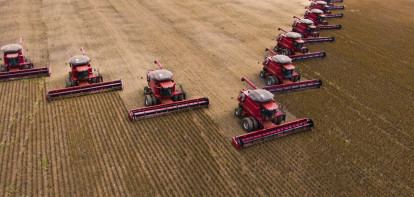Analysis Grains
The Kremlin tightens reins on grain export
Russia is once again attracting attention in the grain market. After a very good wheat export in the first half of the season, it is now starting to falter. The Kremlin would like to further slow down exports by reducing export quotas. Meanwhile, Argentina sees opportunities for grain exports. According to Argentine exporters, possible trade war initiated by Trump could create gaps.
The December contract for wheat on the Matif closed €2 higher at €211.50 per ton yesterday. Grains on the CBoT also showed a slight increase. Wheat was the biggest gainer, closing 1% higher at $5.37½ per bushel. Corn increased by 0.4% to $4.24½ per bushel. Soybeans declined slightly, closing the last trading session 0.4% lower at $9.85¼ per bushel.
Russia continues to dominate discussions in the wheat market. According to the Russian transport company Rusagrotrans, Russian wheat exports in December could drop to 3.6 million tons from 4.1 million tons in December 2023. The Kremlin is attempting to further slow down wheat exports in the second half of the season. Based on information from the Russian Ministry of Economic Development, the Russian news agency Interfax reports that an export quota of 11 million tons will be set for the period from February 15 to June 30.
This measure follows record-breaking export figures at the beginning of the export season. The abundant supply of Russian wheat pushed prices down on the world market. The wheat harvest in Russia this season was over 10% smaller compared to the previous season. Therefore, it is not really surprising that Russia cannot sustain this export pace.
Economic Devastation
Export quotas were introduced by Moscow nearly three years ago to control food prices in the domestic market. Due to very good harvests, the Kremlin has been able to keep these quotas so high in the past two years that they did not practically hinder exporters. The Russian economy is struggling under the war in Ukraine. The country is facing high inflation (officially reported at 10% in September) and the central bank recently raised the interest rate to 21%. This is affecting the ordinary Russian citizen financially. One of the measures the Kremlin is now taking to curb inflation, according to some analysts, is to tighten its grip on the grain market.
Starting from December 1, Ukraine is implementing a system of minimum prices for essential agricultural goods including grains. With this measure, Ukraine aims to address market disruptions caused by the Russian invasion. Minimum prices are calculated based on customs declarations, adjusted for delivery terms of the previous month. The minimum price is 10% lower than the average price of the previous month.
Export Opportunities
The news from the Black Sea region is bullish for the wheat market, but bearish news comes from the southern hemisphere. Abares (the agricultural economic institute of Australia) estimates the upcoming grain harvest for the country at 31.9 million tons, which is 23% more than in 2023. The main wheat region of Argentina is also performing well. According to the crop tour of the Bahia Blanca grain exchange, the wheat harvest in the southern half of Buenos Aires province is expected to reach 3.9 million tons. This is 18% more than the previous season, which was very dry. The total Argentine wheat harvest is estimated by the USDA at 17.5 million tons, compared to 15.9 million tons the previous year.
Argentine exporters hope to benefit from the import tariffs of the upcoming U.S. President Trump. As is known, this has put pressure on the relationship between China and the U.S. Brazil has managed to benefit from Trump's first trade war and has become the main soybean supplier to China. Argentine exporters hope to replicate that success with wheat among others. Argentina does have export duties ranging from 12% to 33%, making Argentine products relatively expensive in the global market. Exporters would like to see these duties removed. Whether that will happen remains to be seen. Argentine President Milei needs these revenues to balance his budget.




